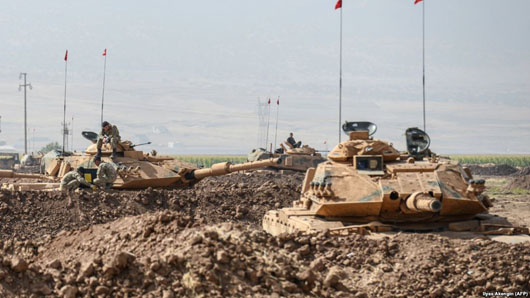by WorldTribune Staff, October 4, 2017
In the wake of Iraqi Kurdistan’s independence vote, Iraq, Iran and Turkey are taking steps to ensure that borders in the region remain unchanged.
Turkey’s leader is huddling with Iran’s leadership in Teheran and the Iraqi government has demanded that the Kurdistan Regional Government (KRG) cancel the result of the referendum or face continued sanctions, international isolation, and possible military intervention.

Baghdad already has imposed sanctions on Kurdish banks and halted foreign currency transfers to the region, and a flight ban has halted all international flights from servicing the Iraqi Kurdish territory’s airports.
The Iranian military announced on Oct. 2 it would host joint military exercises with the Iraqi army near the Iraqi Kurdish region. The drills involved armor and artillery units as well as other air units.
Turkish President Recep Tayyip Erdogan met with Iranian President Hassan Rouhani in Teheran on Oct. 4.
At a joint news conference, Rouhani said “We will not accept changing borders in the region. Turkey, Iran, and Iraq have no choice but to take serious and necessary measures to protect their strategic goals in the region.”
Calling the referendum “illegitimate,” Erdogan said that “a development of this sort will isolate the Kurdish regional government. From this moment onward, more decisive steps will be taken. As Iran and Turkey – and the [Iraqi] central government – there are still heavier steps for us to take.”
Erdogan is also scheduled to meet Iranian supreme leader Ayatollah Ali Khamenei during his visit to the country.
In a report about the Iran-Iraq military exercises, Iran’s semiofficial ISNA news agency quoted the commander of the ground forces of Iran’s Islamic Revolutionary Guards Corps (IRGC), Mohammad Pakpour, as saying that “Iran and Iraq have common enemies and they need to ensure the security of their own borders against threats.”
An official in Iraq’s Kurdish region said that Iraqi and Iranian units began exercises at 11 a.m. local time “only 250 meters from the border.”
“Iraqi forces are dressed in black and there is a large number of Iranian forces,” said Shwan Abu Bakr, the customs chief at the Bashmakh border post between Iraq’s Kurdish region and Iran.
Iranian armed forces spokesman Masoud Jazayeri said the decision to carry out the drills followed a high-level meeting of Iranian commanders where “the territorial integrity and unity of Iraq and the illegitimacy of the independence referendum in northern Iraq were stressed again.”
Iraqi soldiers last week also took part in a Turkish military drill close to Iraq’s frontier.
Russian President Vladimir Putin said on Oct. 4 that Moscow would not interfere in the Kurdish referendum issue.
“Our statements are rather careful and cautious since we don’t want to aggravate or blow up the situation,” Putin said.
Subscribe to Geostrategy-Direct __________ Support Free Press Foundation
